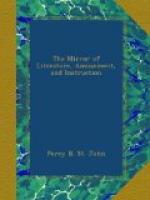* * * * *
WOMAN.
There is no doubt that the proper study of mankind is WOMAN; and Mr. Pope was wrong; for the endless variety of character among the sex is of itself a mine, endless and inexhaustible; but to study them in their domestic capacity, is the sweetest of all—
Man may for wealth or glory roam,
But woman must be blest at home.
To this her efforts ever tend,
’Tis her great object and her end.
So says one poet, I have forgot his name. Another hath this expression—
O woman! lovely woman! Nature form’d
thee
To temper man; we had been brutes without
thee.
But the sweetest thing that ever was said of woman in this amiable capacity, or ever will be said again, is by a contemporary:—“A woman’s whole life is a history of the affections. The heart is her world; it is there her ambition strives for empire; it is there her avarice seeks for hidden treasures. She sends forth her sympathies in adventure; she embarks her whole soul in the traffic of affection; and if shipwrecked, her case is hopeless, for it is a bankruptcy of the heart!”—The Ettrick Shepherd.
* * * * *
BURMESE TEMPLES.
In the Burman towns and villages the number of temples seem to exceed the number of dwellings, which is not unusual. The former are as splendid as gilding can make them, and the latter as humble as can be conceived from the frail materials of which they are constructed—bamboos, palm leaves, and grass. The wealth of a Burman, always insecure, is very generally expended on the luxury of temple-building. Religious merit, indeed, consists mainly in the construction of one of these huge, costly, and showy edifices; and is not considered as increased by building a durable one. No one ever thinks of repairing or restoring an old temple; and the consequence is, that in every part of the country may be seen half-finished structures of enormous magnitude—the respective founders having died before they were completed.—Crawfurd’s Embassy to Ava.
* * * * *
Valmontone, on the road from Naples to Rome, is a strange but enchanting spot, enveloped in shade, with magnificent rocks (agglomerated volcanic ashes) hollowed into caverns, which afford coolness in this burning climate, and where an incredible number of nightingales make the whole air musical. The little town rose picturesquely on its rocky pedestal, with a large building like a monastery inhabited by myriads of swallows, darting in and out at its sashless windows. A solitary guardian eyed us through a door a-jar, but did not come out, while we went round the church, and admired some good pictures remaining on its walls. The stillness of death prevailed in the town—a sort of unburied Pompeii through its narrow lanes,




